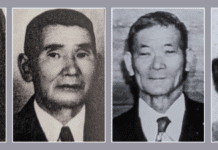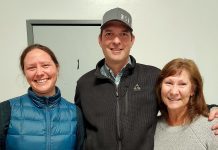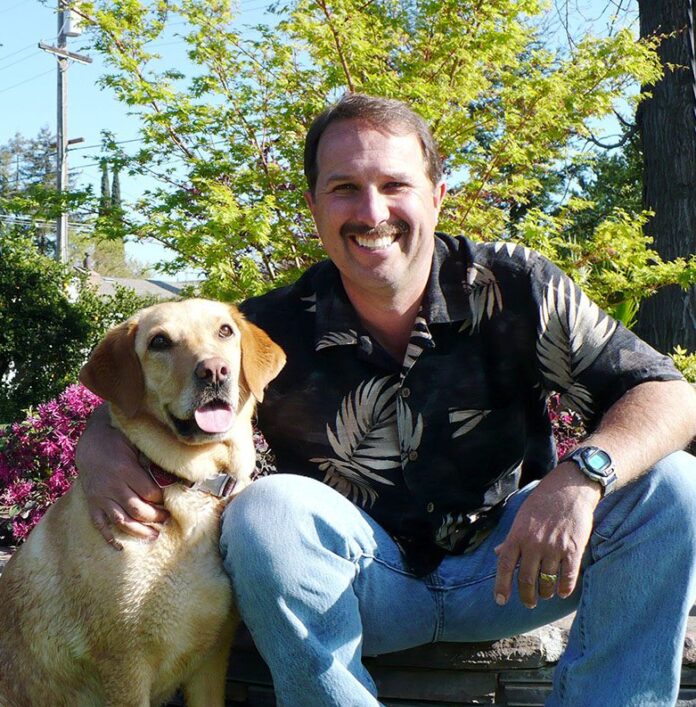
For over three decades, Roger Duncan has equipped growers in Stanislaus County and beyond with essential tools for success. Duncan officially retired on July 1, concluding a prolific career. Since 1990, he served as the UC Cooperative Extension pomology farm advisor in Stanislaus County, participating in on-farm research projects with over 100 local growers there, ranging from single-season studies to those spanning more than two decades.
Duncan’s research has significantly impacted California agriculture. His 22-year trial on almond tree spacing and minimal pruning showed closely planted trees are easier to maintain, more productive and potentially more profitable with a longer lifespan than conventionally spaced orchards. The study also found pruning does not benefit yield. Initially skeptical, Duncan noted similar findings from previous studies, including a 21-year trial in Arbuckle, Calif. with consistently confirmed results.
Other important studies he worked on included almond rootstock and variety trials, almond orchard compost trials and studying whether self-fertile almond varieties benefit from bees (they do, he found).
But Duncan’s legacy is more than just statistics and research. In the wake of his retirement, his colleagues, grower collaborators, and friends, are reflecting on the legacy of a man whose contributions to California agriculture paved the way for a future that wouldn’t look the same without him.
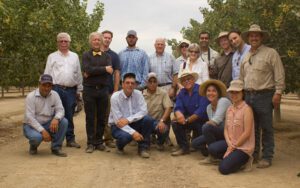
Growers, Colleagues on Duncan’s Impact
Duncan is leaving a huge hole, said Blue Diamond Grower Relations Vice President Mel Machado. There’s a joke among many in the industry, according to Machado, that Duncan could call a last-minute meeting in a random location without even providing coffee and donuts, and 300 people would still show up.
“He’s got that kind of respect within the grower community,” Machado said. “He’s a solid researcher who speaks farmer. He understands what the producer is trying to accomplish, he understands the challenges they face. His work has been very practical.”
Duncan was the authority on rootstocks, Machado said.
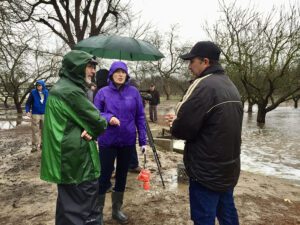
“There are things that I say I can’t keep up with, I’m just going to lean on other people, and rootstocks was one of those things,” he said. “I’d say, ‘You know what? We’re just going to call Roger.’”
But it was Duncan’s pruning study that was the most revolutionary and impactful in Machado’s mind.
“It was just spot-on for answering a lot of questions that people had, and answering questions that people had never even thought of,” he said. “It’s changed the way we grow almonds.”
The study taught almond growers that just by altering the way they do things a little bit, they could make more money, Machado said.
Noting the almond industry is blessed with top-notch UCCE farm advisors a lot of other crops in California don’t necessarily have, Machado said while he will miss being able to work closely with Duncan, he doesn’t think this is the last the industry will hear from him.
“Like a lot of the other farm advisors, they tend to not fade away, they’re still out there and available, and I’m looking forward to working with him in the future,” Machado said.
Tom Orvis, governmental affairs director for Stanislaus County Farm Bureau (SCFB), board president for Oakdale Irrigation District and an almond grower who has worked with Duncan for years, recalls Duncan’s passion for walking among the trees.
“As a new grower, Roger pointed things out to me I didn’t see,” Orvis said.
Like Machado, Orvis was also impacted by Duncan’s pruning study.
“The studies he was involved with changed the way we do business,” Orvis said. “I haven’t pruned in four years, and my trees are growing.”
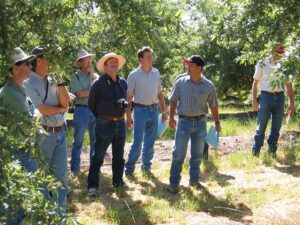
His research on wintertime flooding was also notable to Orvis, who said it gave growers more options with storm water, which is especially important as the Sustainable Groundwater Management Act starts to take effect.
As farm advisor’s cycle through SCFB’s board meetings each month to deliver research updates, Orvis said Duncan was a familiar face who the board was always eager to hear from.
“When Roger came, there was always a lot of interest and a lot of questions,” Orvis said. “Our board probably has at least 50% that grow almonds, so they loved to pick his brain, and he was always very open and honest with them. We had a very good relationship with Roger and still have one with the entire [UCCE] team; they’re an important member of our Farm Bureau team.”
Jennifer Heguy is a member of that team. Serving as Stanislaus County’s UCCE dairy advisor and county director, she’s worked with Duncan in some capacity for more than a decade and a half.
To Heguy, Duncan exemplified what it means to be a farm advisor.
“Roger is extremely knowledgeable and personable, which, when combined with 30 plus years of asking questions and learning through his research, made him the source of information on all things almonds, peaches, etc.,” Heguy said. “His research and extension program has set the bar for all new farm advisors in Stanislaus County, and I consider myself extremely lucky to have worked with him for the first 16 years of my career.”
Heguy said UC ANR awarded Roger with the Distinguished Service Award this past June for Outstanding Extension for his exceptional contributions.
“I couldn’t think of a more fitting way to end such an amazing career,” she said.
UCCE Orchard Systems Farm Advisor Franz Niederholzer said Duncan’s extension efforts were extensive and exceptionally effective.
“His spacing trial in eastern Stanislaus County, along with rootstock trials and organic matter work, had huge impacts on almond growing,” Niederholzer said.
He said Duncan’s immense impact on the almond industry during his career stemmed from his careful research on varieties, rootstocks, all manners of pest management, irrigation and fertility and nutrient inputs.
“He presented those results in careful, effective and memorable language,” Niederholzer said. “When Roger talked, people listened.”
UCCE Orchard Systems Farm Advisor Katherine Jarvis-Shean first met Duncan when she was a grad student at UC Davis about 15 years ago. As a colleague, she said he’s an amazing person who always had time for mentoring in all thing’s almonds and farm advisor how-to’s.
While much of Duncan’s career consisted of research that was well-known within the ag community, Jarvis-Shean said he was also someone who did far more work behind the scenes than most people realize.
“Roger’s just been great for the industry as a whole in a lot of ways that people realize and in a lot of ways people probably don’t realize,” she said.
Jarvis-Shean is currently the pomology program team chair for the UC system, a position that Duncan held for several years. She refers to it as the “team mom” role for orchard crops, and while it’s likely one of the lesser-known positions within the UC system, she said, it’s a crucial one that Duncan excelled in.
“It keeps all the orchard people connected, makes sure we’re all talking to each other, that our research makes sense, that it’s practical, that research projects are taking advantage of the different kind of smarts within the UC system, and getting new farm advisors connected and tapped in to the whole community as well as advocating for new orchard advisor positions,” she said.
She noted Duncan also served as a committee member and liaison for the Almond Board of California (ABC), a responsibility that allowed him to be an advocate for growers within ABC.
“He’s been a great voice for research-based practicalities and what the Almond Board has been doing, where they’re going to spend their money and where they were going to invest in research,” Jarvis-Shean said.
Jarvis-Shean said Duncan’s farm advisor position will eventually be filled with one of 30 or so advisors in a new round of hiring that will be based in Stanislaus County but also cover San Joaquin County.
“I think across the system we recognize there’s a huge number of acreage there, but also there are a lot of small growers there, growers who really benefit from having a position like Roger’s that we didn’t want to leave high and dry,” she said.
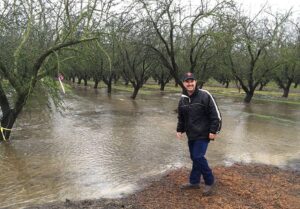
A Dream Job
While appreciation for Duncan runs deep within the grower and UC community, he remains modest about his impact.
“The part I guess I’d be the proudest of is that people actually called me for advice, and sometimes even followed it,” he joked.
He is also pleased with his role in helping the almond industry consider new rootstocks tailored to specific orchards, rather than just falling back on what they’ve always done or what the nurseries suggested, he said.
Duncan also highlighted an early study in his career that challenged the routine practice of annual dormant spraying with copper, oil, and insecticides, leading to most orchards no longer receiving dormant sprays. He said, all of their fears of the disease and insect outbreaks were unwarranted.
“Although I know that PCAs and the ag supply dealerships were affected, that’s a big savings for growers and also has an environmental impact as well,” he said.
He humbly noted that while some of the most interesting things he’s been a part of may not seem groundbreaking, they’re still important, like the evolution of orchard design, spacing, and rootstocks.
“Just the whole orchard design configuration has changed, and I guess I feel like I have contributed at least a little to that,” he said.
Born and raised in Stanislaus County, where he later spent his career, Duncan quickly built strong connections within the ag community. He said he was pleasantly surprised by how eager people were to welcome him into the role and onto their farms.
“I was amazed at how welcoming everybody was and how they really wanted to help, to get me trained up, so I could hopefully be of some value for people here,” Duncan said.
Despite being officially retired, he continues to oversee several ongoing studies, aiming to maintain them in Stanislaus County until a successor can take over.
Reflecting on his career as a UC farm advisor, Duncan described it as a dream job.
“It really was a good fit for what I enjoyed; the public service aspect of the job, being a part of the ag community and having an economic impact in the community that I live and work in. This job also helped satisfy my scientific curiosity. What happens when we do this or don’t do that? I’m just thankful I had the opportunity,” he said.



